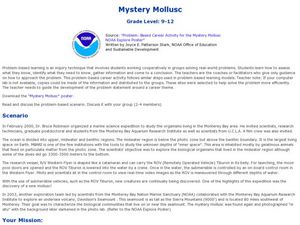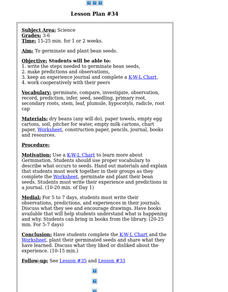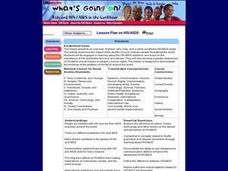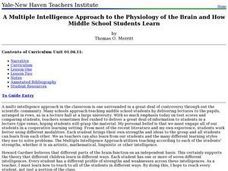Curated OER
Orca United Nations
Students study the differences between sets of data and explain how organisms are adapted to their environment. In this marine mammals lesson students analyze data based on set criteria.
Curated OER
Mystery Mollusc
Students investigate the different regions of our oceans by researching the Internet. In this oceanography lesson, students discover the different jobs related to ocean research and examine their roles by reading related websites. ...
Curated OER
Oceans - a cause for concern
For this oceans worksheet, students click on the links to learn about the problems in the ocean and follow the steps on creating a project to help fix the problem. Students complete 4 steps.
Curated OER
Introduction of the Lunar Relief Map Project
Students investigate the geographic features of the surface of the moon. For this lunar relief map lesson, students watch and discuss the Apollo II Moon landing and make preliminary plans for their lunar maps.
Curated OER
Mammals Have hair or Fur
First graders complete computer activities, make a mask, separate pictures, and more having to do with mammals. In this mammals lesson plan, 1st graders classify animals as being mammals or non mammals based on their hair or fur.
Curated OER
Mammals Have Fur
First graders study animals. In this animal classification lesson, 1st graders explore the characteristics (primarily fur) that distinguish animals as mammals. They work in groups at various stations that practice this classification...
Curated OER
Newton's Laws of Motion
Learners investigate the effect of thin films to surface friction. In this physics lesson, students calculate the coefficient of friction using mathematical formulas. They discuss its importance in their everyday lives.
Curated OER
Seahawk Educational & Environmental Discovery Program
Students identify and describe local poisonous plant/animals. They compare characteristics of three local ecosystems and describe common plants from different ecosystems; comparing shapes, colors, textures, and measuring sizes.
Curated OER
Travel to the Polar Lands
Second graders receive an "Expedition Ticket" to travel through the Polar Regions- the Arctic and the Antarctic. They research polar bears and make drawings that are to scale.
Curated OER
Germinate Bean Seeds
Students write the steps needed to germinate bean seeds, make predictions and observations and keep an experience journal and complete a chart.
Curated OER
Energy Efficient Home Design
Students investigate the applications of energy efficient homes. They conduct Internet research, complete a worksheet, evaluate the energy efficiency of a home design, and complete a research report on energy efficient homes.
Curated OER
Take the One-Tonne Challenge!
Students explore about the One-Tonne Challenge, and work out how they could reduce their greenhouse gas emissions (GHGs) by one tonne, through individual actions and by influencing other people. Students use a GHG emission table to...
Curated OER
Lesson Plan on HIV/AIDS
Students examine where, why, how and in what conditions HIV/AIDS exists. They examine the deadly impact this virus has had on the world and look at how to prevent the spread at home. The students also develop a greater awareness of the...
Alabama Learning Exchange
As Large As Life. . . A Poster of a Human Body System
Learners explore the major systems and functions of the human body. In this anatomy lesson, students make life-size outlines of bodies, diagram body systems, and present their work to their classmates.
Curated OER
Why Do Geese Fly South For the Winter?
Fifth graders examine migration by tracing animal migration routes on a map. In this animal life lesson, 5th graders observe a map of North America and read about the migration patterns of geese. Students trace the path most geese take...
Curated OER
Photodocumentation: Promoting Environmental Education Through the Development of Visual Literacy Skills
Students construct a photo document on their selected topic and use at least twelve photographs in their photo document. One must be of the authors. Additionally, they must write five interactive questions which help viewers interpret...
Curated OER
ASPIRIN (Assess Simulated Presentation Involving Realistic Injury Now)
Students integrate biology and chemistry into a medical framework. They nterpret observations and data and evaluate their hypotheses in the light of the data obtained.. They make appropriate diagnosis and recommend treatment.
Curated OER
Invertebrate Research Project
High schoolers keep a scientific research notebook on an invertebrate detailing its behavior and responses.
Curated OER
Animal Report
Second graders research an animal of their choice and then write a structured report about it. They use Word Art to make a cover for their report.
Curated OER
What Makes up an Ecosystem?
Eighth graders design posters of working ecosystems using pictures from magazines. They label autotrophic, heterotropic, or saprotrophic energy sources, and identify predators and prey.
Curated OER
Rain Forest Animals
Students create a book about animal species found only in the Amazon rain forest. They find one species to represent each letter of the alphabet, and write each name on a different piece of paper. They illustrate each page with an...
Project SMART
Dinosaur Trek
Second graders investigate dinosaurs. They explore various websites, submit questions to a paleontologist online, construct cut and paste model dinosaur skeletons, develop a graph to compare dinosaurs, and label pictures from online...
Curated OER
A Multiple Intelligence Approach to the Physiology of the Brain and How Middle School Students Learn
Pupils draw a poster of a lateral view of the brain in order to label the different lobes of the brain. They examine what causes some people to be more musically intelligent than others. They dissect a cow's brain and label the different...
Curated OER
Respiration in Sammy's Cells
Students practice translating biological ideas into graphical representations and explore respiration in the context of an exercise session in this 50 minute lesson on aerobic and anaerobic respiration. The lesson includes a question...

























